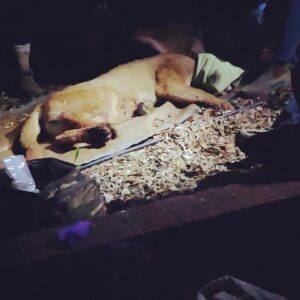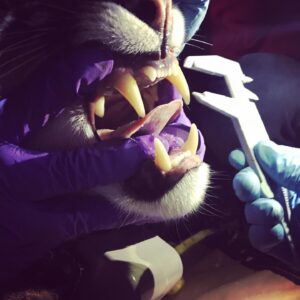Back in late August we got a call from a landowner in Scottsvalley about a deer that had been killed by a puma on her property. The puma had caught the deer on a long driveway leading up to residences at a little after dusk. The driveway had fences to either side with little to no cover and so the puma was only able to drag the deer a short distance off the road. The story was that as a resident was pulling up the long driveway a mountain lion darted across the road, jumped a 7 ft fence and ran off into the surrounding vegetation. In the morning they went out to investigate and found the deer.
The property owner was nice enough to give us a call and we headed out to investigate. After examining the area and the kill we determined that it was a safe location to attempt a capture.
 So we set our cage trap and waited… It was close to midnight when the puma returned to her previous nights dinner and entered our trap. We had caught a healthy female puma. This is 109F and she weighed in at 75 lbs, a relatively healthy weight for a female puma in the Santa Cruz Mountains. The workup and collaring went smoothly and we were able to release her in the woods surrounding the property she was captured near.
So we set our cage trap and waited… It was close to midnight when the puma returned to her previous nights dinner and entered our trap. We had caught a healthy female puma. This is 109F and she weighed in at 75 lbs, a relatively healthy weight for a female puma in the Santa Cruz Mountains. The workup and collaring went smoothly and we were able to release her in the woods surrounding the property she was captured near.

Over the next couple of months I would head out and investigate the different places she had been occupying using the GPS locations from her collar. I was able to find some old kills that she was no longer feeding on, day beds, and various trails and creeks she had been traveling by. As the days wore on I began to notice a lot more disturbance at her GPS locations then is typical to a solitary female puma. During one of these “cluster” investigations I found a freshly killed deer that I suspected she would be returning to and placed a trail camera on it. That was when we discovered that 109F was a mother of three 4-6 month old kittens. Such an exciting discovery!
Here is a short video of our discovery. Although pumas cannot roar like a traditional large cat they can make a variety of other noises.
The mortality rate is high for puma kittens coming of age in the Santa Cruz Mountains where some of the main risks are starvation, other carnivores (including other mountain lions), car collisions, and disease. Its going to be a long road ahead for these young predators and we wish them all the best.
